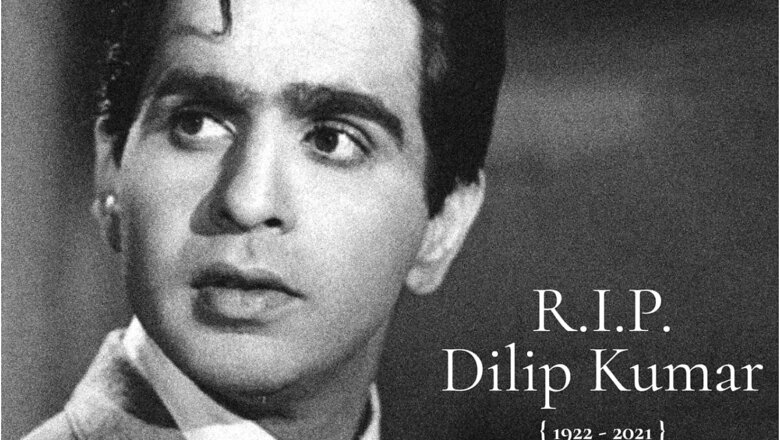
views
Years before he became a film star, Dilip Kumar had spent a night in Yerawada jail fasting with Mahatma Gandhi’s followers. It was the time of the Second World War and Dilip, who was then Yusuf Khan, was employed as a manager in an Army canteen in Pune. He made a well-rehearsed speech on why India should fight for independence even as it chose to remain unaligned in the war. The police arrested and handcuffed him for airing anti-British views from the Army club and he was lodged with other satyagrahis.
In his autobiography, Dilip Kumar – The Substance and the Shadow (Hay House India, 2014), Dilip Kumar recalls, ‘I exchanged pleasantries with my fellow inmates and they told me that Sardar Vallabhbhai Patel was in one of the cells and they were all on a hunger strike along with him. I don’t know why but I too felt I should fast with them. So I refused the food that was brought for me on an unclean plate.’ He was released the morning after.
Dilip Kumar was deeply influenced by Jawaharlal Nehru and remained a staunch Congress supporter throughout his life. The actor’s career took off and peaked in the Nehru era (1947-64) when 36 of his 57 films were made, coinciding with Nehru’s tenure as the Prime Minister. In fact, throughout the Nehruvian era, Dilip Kumar essayed a range of popular characters that reflected Nehruvian ideology and optimism that inspired Indian youth. There was a strong personal rapport between Nehru and Dilip Kumar. The actor told journalist Pankaj Vohra in an interview that his father Ghulam Sarwar Khan and grandfather Haji Mohammed Khan belonged to the Congress in Peshawar of the North West Frontier during the pre-Independence days. (Hindustan Times, April 26, 1996).
Nehruvian ideas of secularism were extremely close to the young Dilip Kumar and he would often attend Nehru’s political rallies. According to journalist-editor Vir Sanghvi, if one wanted an example of the success of Indian secularism, Dilip Kumar had fitted the bill. ‘He has been a truly patriotic Muslim. And India, in turn, has honoured him by treating him as a legend in his own lifetime.’
But the legend had his own share of discomforts, which started with his name. It is not a coincidence that so many stars of that period played down their Muslim parentage, because the studios believed that in the India of that era, it helped if people thought you were a Hindu. In Dilip Kumar’s own words, actress, producer and owner of Bombay Talkies Studio Devika Rani was instrumental in giving him a screen name sometime around 1943.
A Nehru Loyalist
Other than Nehru, Dilip Kumar had few friends in politics—Rajni Patel was the closest and Bal Thackeray the oldest among them. The fourth politician who finds mention as a friend in the thespian’s autobiography is Maratha strongman Sharad Pawar.
With Rajni Patel and Jawaharlal Nehru, Dilip Kumar had memorable first introductions. Patel, a noted barrister and fundraiser for the Congress party in the sixties, didn’t know who Dilip Kumar was when they met at the party offices in Mumbai in 1962. In sharp contrast, Nehru affectionately singled Yusuf out from the crowd on a film set in 1959. Dilip’s run-in with the late Shiv Sena supremo in 1998-99 over the honour to the Peshawar-born actor by the Pakistan government was no less interesting.
Dilip Kumar had limited friends in politics because, in his own words, ‘My involvement in politics would be limited to the pre-election campaigns that I would take part in.’ Of course, he campaigned for a score of Congress candidates till as late as 1999 Lok Sabha polls but would not care to remember their names once the poll meeting was over.
Dilip Kumar used to recall only one election campaign vividly and that was his first: In 1962, Jawaharlal Nehru called him on the phone from Delhi, asking to canvass in favour of Congress candidate from North Bombay V.K. Krishna Menon. It was indeed a tough contest for Menon, Nehru’s trusted aide, because he was pitted against socialist warhorse Acharya J.B. Kripalani. The Prime Minister was obviously aware of the formidable challenge his Marxist friend faced from Praja Socialist Party candidate, and Nehru was equally aware of Dilip Kumar’s popularity too.
While thinking about roping in Dilip Kumar for the campaign, Prime Minister Nehru may have recalled how he had got Dilip Kumar’s dacoit-based film Ganga-Jumna (1961) cleared, overriding the censor board’s objections to its theme. Memories of his first meeting with Dilip Kumar on the sets of Paigham in 1959 in Madras may also have flickered on Nehru’s mind. ‘Yusuf, I heard you were here and I decided to drop in,’ Nehru had remarked, stretching his arm over Dilip Kumar’s shoulder affectionately.
Nehru’s affection towards Dilip Kumar took every one on the set by surprise for they were expecting the Prime Minister to greet actor Vyjayanthimala first. There was a reason for such an expectation: in the run up to the PM’s scheduled arrival, the set was abuzz for two days with animated talks about an event in Delhi where Nehru was the chief guest and Vyjayanthimala was at the centre-stage as the performer of the evening. A year after this fortuitous meeting with Nehru, Dilip Kumar was compelled to call on the Prime Minister to seek intervention for getting his ambitious film Ganga Jumna cleared by the censor board. The meeting resulted in a go-ahead for not only Dilip’s film but also all others held up until then, much to the chagrin of then I&B minister Dr B.V. Keskar.
ALSO READ | ‘Pitayi Ke Darr Se’: When Yusuf Khan Revealed Why He Became Dilip Kumar
Writer-journalist Vir Sanghvi thinks that the Ganga Jumna episode had a tinge of communal angle too since, according to him, the censor’s reluctance to clear the film had something to do with Dilip Kumar’s real life identity as Yusuf Khan. ‘The censors gave the game away when they objected to Dilip Kumar’s last words in the movie. Just before his character died, he said, “Hey Ram.” That had to go, said the censors. Why, asked Dilip Kumar. Because those were Gandhiji’s last words. But surely, any Hindu would think of Ram when he was dying. Yes, said the censors, any Hindu would… There is no doubt that Dilip Kumar believes his religion had something to do with it,’ wrote Sanghvi in 1999. Dilip Kumar stayed quite loyal to Nehru throughout and when the latter sought his help for campaigning, Dilip Kumar readily obliged. ‘I obeyed Panditji at once, my love and respect for him being next only to the affection and admiration I had for Agha ji (Dilip’s father).’
The Sheriff of Bombay
During one of his visits to the Congress office, while Dilip Kumar was waiting for V.K. Menon, a well-dressed man came to him hurriedly and introduced himself saying; ‘My name is Rajni. I practise law for a living.’ To which Dilip Kumar replied, ‘I am Yusuf, I don’t do anything for a living.’ Later an apologetic Rajni Patel confessed that he was not a movie buff and he had not been inside a cinema house for ages. ‘Rajni Patel and I became close friends as our meetings became regular and purposeful from then onwards. His intellectual sharpness was complemented by his caring nature and the principles he stood for,’ Dilip recalls.
The actor addressed several election meetings for V.K. Menon who won the North Bombay seat comfortably; the victory paving the way for Dilip Kumar to campaign for the Congress candidates more frequently in Maharashtra. According to the thespian, for Rajni and him, the meaning of politics was to serve the common people. ‘Both Rajni and I could have won elections and been in the fray as active politicians but that thought was far from my mind and his.’ Instead of fighting elections, both friends chose to leverage their political connections to bring an art and cultural centre befitting the cosmopolitan stature of Bombay. Such a centre was Dilip Kumar’s idea which his friend Rajni pursued with then Prime Minister Indira Gandhi in the seventies with great vigour.
In 1980, Rajni Patel sprung a surprise on his close friend. He woke up Dilip Kumar who was holidaying at Mahabaleshwar (a hill station, 220 km from Bombay) to announce that he and then Maharashtra chief minister Sharad Pawar had decided to appoint him the Sherriff of Bombay. ‘For a moment I thought it was a prank. I was about to laugh it off when Rajni explained that there was no going back for me as the news had been officially given to the media and I could myself hear it if I switched on the radio.’
Dilip Kumar knew Sharad Pawar from the days the latter was in the Youth Congress. Although a protégé of late Y.B. Chavan, Sharad was close to Rajni Patel and hence had become known to Dilip Kumar. The actor had campaigned for the Maratha strongman for the election to state Assembly from Baramati seat in 1967. Dilip had declined the offer to become Sheriff a couple of times in the past because he had just begun shooting for Manoj Kumar’s Kranti (1981). But Rajni Patel and Sharad Pawar assured him that the new job would not interfere with his shooting commitment.
The news created quite a ripple in the media because it was the first time an actor was being given the position. Although important, the post was apolitical and Dilip too remained so. He said his stints as sheriff and much later as a Rajya Sabha member (2000-2006) were significant only for the opportunity they gave him to do some good social work. ‘I was able to make a contribution to deserving causes from the government funds at my disposal. I derived immense pleasure from the contributions I made over the years. I provided finances to build primary schools in rural Maharashtra,’ he recalled. But there was a tinge of regret too. Dilip Kumar said he was once pressured by a political friend to give away a prized piece of land near his residence at posh Bandra for development by the city’s municipal corporation into a park. ‘Unfortunately, the sad story is that the same land has remained underdeveloped and unattended till this day.’
A Peacenik
The Mumbai riots of 1993 greatly upset Dilip Kumar. The actor’s faith in strong foundations of secularism in India wavered when he provided shelter and succour to riot victims belonging to Muslims of Mohammad Ali Road and Bhindi Bazaar. A disillusioned Dilip Kumar told Anupama Chandra (published in Sunday magazine, February 28-March 6 issue, 1993), ‘In the name of religion, religion itself is abused and defiled. All religions promote thoughts of fellowship, kindness, and consideration. But what is taking place (in Mumbai from January 1993-March 1993) is irreligious and ungodly bestiality let loose on the innocent people. The poor people. They are spread in thousands all over the city with no adequate shelter, no provision for food for themselves or their children. Bas, period. No more talk about this. It makes me sick.’
ALSO READ | Dilip Kumar: Most Memorable Dialogues from His Movies
Tim McGirk of The Independent quoted Dilip Kumar as saying, ‘If I were to make a film of the violence, I would know just the title. The Rage in Heaven. How about it?’ Dilip Kumar told the journalist, ‘It’s bad out there, still. A mob had encircled one slum and they were trying to starve to death the Muslims inside. They hadn’t eaten for three days. Twice we tried to break through with a police escort and we were forced back. Finally, we were able to get in with a large police posse,’ said Kumar.
The brutality had prompted leading film personalities to take out a procession of over 10,000 peace-loving citizens of Mumbai through neighbourhoods gutted by fire and looting. Some went on a hunger strike beside a statue of Gandhi, while others like Shabana Azmi frequently visited areas that were worst affected. Dilip Kumar led a delegation of prominent film personalities to Delhi to plead with then Prime Minister P.V. Narasimha Rao to save Mumbai from being engulfed by religious hatred.
Dilip Kumar enjoyed warmth and affection of a large number of political figures cutting across party lines. BJP veteran Atal Bihari Vajpayee had a lot of faith in Dilip Kumar and even tried to make use of his goodwill on the diplomatic front. According to Pakistan’s former foreign minister Khurshid Mahmud Kasuri, Dilip Kumar had urged then Prime Minister Nawaz Sharif to end post Kargil War hostility. In his book, Neither a Hawk nor a Dove: An Insider’s Account of Pakistan’s Foreign Policy, Kasuri claimed that following the Kargil War in 1999, Prime Minister Atal Bihari Vajpayee had apparently called up Pakistan Prime Minister Nawaz Sharif to express regret that while he (Vajpayee) had been received in the Lahore with such warmth, Pakistan had wasted no time in trying to occupying Kargil. The book then goes on to say that Vajpayee told Sharif that he would like him to talk to someone sitting next to him.
‘Sharif was astonished to hear the voice of Dilip Kumar (earlier Yusuf Khan), who was originally from Peshawar, tell him. “Mian Sahib, we did not expect this from you since you have always claimed to be a great supporter of peace between Pakistan and India. Let me tell you as an Indian Muslim, that in case of tension between Pakistan and India, the position of Indian Muslims becomes very insecure and they find it difficult to even leave their homes. Please do something to control this situation.”’ the book said.
Read all the Latest News, Breaking News and Coronavirus News here.



















Comments
0 comment